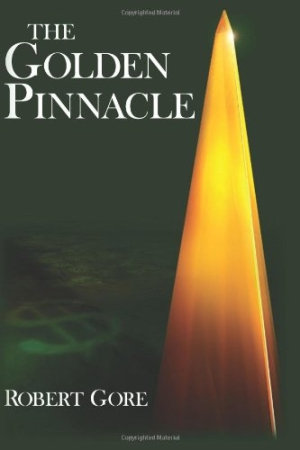The Golden Pinnacle
One man’s rise from street urchin to multimillionaire sets off a tale of family drama filled with love, power, and revenge.
Sometimes business becomes personal. In this thoughtful historical saga, Robert Gore examines the transforming power of the Industrial Revolution as experienced through the life of one man who rides this wave of social change and even tries to harness or redirect it. Social and historical commentary undergirds this almost Dickensian story. And along the way, a history lesson is given on big banks, business monopolies, Wall Street, railroad tycoons, and economic policy decisions that impact us today.
When Daniel Durand, an orphan with no prospects or connections, leaves military service after sustaining an injury during the Civil War, he decides to become a banker. With a fighting nature developed on the streets and a keen mind that sees what others don’t, nothing will stop him from far exceeding that initial dream. He quickly rises to the top of the financial and business worlds, quietly ranked among the Rockefellers and Vanderbilts. But one doesn’t reach such heights without making a few enemies, and Durand has his share of those.
Generally well paced, this is a classic rise-to-power story with history successfully blended into the plot. The protagonist even directly participates in significant events, such as bank runs or key Civil War battles. The narrative is slowed slightly with some highly detailed investment strategy descriptions and some jumps in time, but both prove to be only minor distractions.
Characters in the novel are well crafted and three dimensional; sympathetic characters have flaws to match their strengths. Some historical bias is apparent in descriptions of certain key figures, as the author is unafraid to question the motives and character of people like Abraham Lincoln and John D. Rockefeller. Although Durand is almost too perfect, too prescient in his investment views and strategies, the story manages to stay believable.
The family drama is particularly realistic—an impossible-to-get-along-with in-law, a favorite child and an ignored child, a father who learns certain lessons too late. These are things almost every family can relate to in some way.
Under it all are messages about business, finance, and government that are surprisingly relevant today. No matter where one comes down on the issues raised, such as how much the government should control the economy, Gore’s book certainly provides fodder for thought. For readers interested in historical sagas or current economic events, there’s plenty to enjoy.
Reviewed by
Diane Gardner
Disclosure: This article is not an endorsement, but a review. The publisher of this book provided free copies of the book and paid a small fee to have their book reviewed by a professional reviewer. Foreword Reviews and Clarion Reviews make no guarantee that the publisher will receive a positive review. Foreword Magazine, Inc. is disclosing this in accordance with the Federal Trade Commission’s 16 CFR, Part 255.

